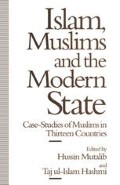Abstract
The role of Islam in Pakistani politics under Zulfikar Ali Bhutto (December 1971–July 1977) and Muhammad Zia-ul-Haq (July 1977–August 1988) indicates that Bhutto used Islamic rhetoric and symbolism to bring about, paradoxically, an Islamic revival that resulted in his overthrow. Zia-ul-Haq’s ‘Islamisation’ campaigns have been much highlighted in the international media, and, like Bhutto, were used as a legitimising agent or strategy to secure the support of the polity.
Access this chapter
Tax calculation will be finalised at checkout
Purchases are for personal use only
Preview
Unable to display preview. Download preview PDF.
Notes
Salman Taseer, Bhutto: A Political Biography (London: Ithaca Press, 1979) pp. 25–7;
Dilip Mukerjee, Zulfikar Ali Bhutto: Quest for Power (New Delhi: Vikas Publishing House, 1972) p. 27
Mukerjee, op. cit., pp. 44–5; S. M. Burke, Pakistan’s Foreign Policy: A Historical Analysis (London: Oxford University Press, 1973) pp. 275–9; Taseer, op. cit., pp. 49, 53–5;
William Barnds, Indian, Pakistan and the Great Powers (New York: Praeger Publishers, 1972) pp. 185–92.
Mukerjee, op. cit., pp. 44–5, 48; S. M. Burke, op. cit., pp. 275–9, 341–57; Taseer, op. cit., pp. 49, 53–7; Barnds, op. cit., pp. 185–92; Shirin Tahir-Kheli, The United States and Pakistan: The Evolution of an Influence Relationship (New York: Praeger Publishers, 1981) pp. 19–24.
Lawrence Ziring, ‘Pakistan and Bangladesh: Quest for Identity’, in An Introduction to Asian Politics, edited by C. I. Eugene Kim and Lawrence Ziring (Englewood Cliffs, NJ: Prentice-Hall, 1977) pp. 202–3.
Bhutto’s public meeting in Jhelum on 21 January 1970, quoted in Meenakshi Gopinath, Pakistan in Transition: Political Development and Rise to power of the Pakistan People’s Party (New Delhi: Manohar Book Service, 1975) p. 67.
Craig Baxter, ‘Pakistan Votes, 1970’, Asian Survey, vol. XI, March 1971, pp. 197–218.
See Waheed-uz-Zaman, ‘Editor’s Note’, in The Quest for Identity, Proceedings of the First Congress on the History and Culture of Pakistan held at the University of Islamabad, April 1973 (Islamabad: University of Islamabad Press, 1974) p. i;
Lawrence Ziring, ‘Introduction’, in Pakistan: The Long View, edited by Lawrence Ziring, Ralph Braibanti and W. Hoard Wriggins (Durham: Duke University Press 1977) p. 6.
Zulfikar Ali Bhutto, My Execution (London: Musawat Weekly International, January 1980) p. 1.
A. H. Syed, Pakistan: Islam, Politics and National Solidarity (New York: Praeger Publishers 1982) p. 126.
See Z. A. Bhutto, A Journey of Renaissance (published by the Ministry of Information, Government of Pakistan, November 1972) p. 7.
M. G. Weinbaum and Gautam Sen, ‘Pakistan Enters the Middle East’, Orbis, vol. 22, no. 3, Fall 1978, p. 600.
Rafiq Akhtar (ed) Pakistan Year Book (Karachi: East-West Publishing Company, 1974) pp. 122–5.
Zulfikar Ali Bhutto, If I am Assassinated (New Delhi: Vikas Publishing House, 1979) p. 137.
Steve Weissman and Herbert Krosney, The Islamic Bomb: The Nuclear Threat to Israel and the Middle East (New York: Times Books, 1981) pp. 53, 62–4.
Jamil Rashid, ‘The Political Economy of Manpower Export’, in Hassan Gardezi and Jamil Rashid (eds), Pakistan, The Roots of Dictatorship: The Political Economy of a Praetorian State (London: Zed Press, 1983) p. 222.
Hussain, Elite Politics in an Ideological State (Kent, Dawson and Sons Ltd, 1979) pp. 142–3.
Mumtaz Ahmad, ‘Islamic Revival in Pakistan’, in Cryriac K. Pullapillay (eds.), Islam in the Contemporary World (Notre Dame, Indiana: Cross Roads Books) p. 266; Also, see Shahid Javed Burki, ‘Economic Management within an Islamic Context’, in Anita M. Weiss (ed.), Islamic Reassertion in Pakistan: The Application of Islamic Laws in a Modern State (New York: Syracuse University Press, 1986) pp. 49–57.
William L. Richter, ‘Pakistan’, in Mohammed Ayoob (ed.), The Politics of Islamic Reassertion (New York: St Martin’s Press, 1981) p. 144.
Kemal A. Faruki ‘Islami Government and Society’, in John Esposito (ed.), Islam in Asia: Religion, Politics and Society (New York: Oxford University Press, 1987) p. 59.
Quoted in Barbara D. Metcalf, ‘Islamic Argument in Contemporary Pakistan’, in William R. Roff (ed.), Islam and the Political Economy of Meaning: Contemporary Studies of Muslim Discourse (Berkeley: University of California Press, 1987) p. 136.
Richter, op. cit., p. 151; Also, see Charles J. Adams, The Ideology of Mawlana Mawdudi’ in Donald Eugene Smith (ed.), South Asian Politics and Religion (Princeton: Princeton University Press) pp. 371–97; Zohair Hussain, ‘Maulana Sayyid Abul A’la Maududi: An Appraisal of His Thought and Political Influence’, South Asia: Journal of South Asian Studies, vol. IX, no. 1, June 1986, pp. 61–82.
Craig Baxter, ‘Restructuring the Pakistan Political System’, in Shahid Javed Burki, Pakistan Under the Military: Eleven Years of Zia-ul-Haq (Boulder, Colorado: Westview Press, 1991) p. 36.
Richard Reeves, ‘Journey to Pakistan’, New Yorker, vol. LX, no. 33, 1 October 1984, pp. 97–8.
‘Majlis-i-Shoora Approved Law of Evidence Draft’, Dawn, 10–16 March 1983, vol. VII, no. 11, p. 3; Barbara Metcalf, ‘Islamic Arguments in Contemporary Pakistan’, in William R. Roff, Islam and the Political Economy of Meaning (Berkeley: University of California Press, 1987) pp. 132–3.
Shahid Javed Burki, ‘Zia’s Eleven Years: A Chronology of Important Events’, pp. 172–3; William L. Richter, ‘Pakistan: Out of the Praetorian Labyrinth’, Current History, vol. 85, no. 509, March 1986, p. 114.
Quoted in Shirin Tahir-Kheli, ‘In Search of an Identity: Islam and Pakistan’s Foreign Policy’, in Adeed Dawisha (ed.), Islam in Foreign Policy (New York: Cambridge University Press, 1983) pp. 75–6.
Quoted in Rafiq Zakaria, The Struggle within Islam: The Conflict Between Religion and Politics (New York: Viking Penguin, 1988) p. 238.
Editor information
Editors and Affiliations
Copyright information
© 1994 Palgrave Macmillan, a division of Macmillan Publishers Limited
About this chapter
Cite this chapter
Hussain, M.Z. (1994). Islam in Pakistan under Bhutto and Zia-ul-Haq. In: Mutalib, H., Hashmi, T.uI. (eds) Islam, Muslims and the Modern State. Palgrave Macmillan, London. https://doi.org/10.1007/978-1-349-14208-8_3
Download citation
DOI: https://doi.org/10.1007/978-1-349-14208-8_3
Publisher Name: Palgrave Macmillan, London
Print ISBN: 978-0-333-66969-3
Online ISBN: 978-1-349-14208-8
eBook Packages: Palgrave Political & Intern. Studies CollectionPolitical Science and International Studies (R0)

